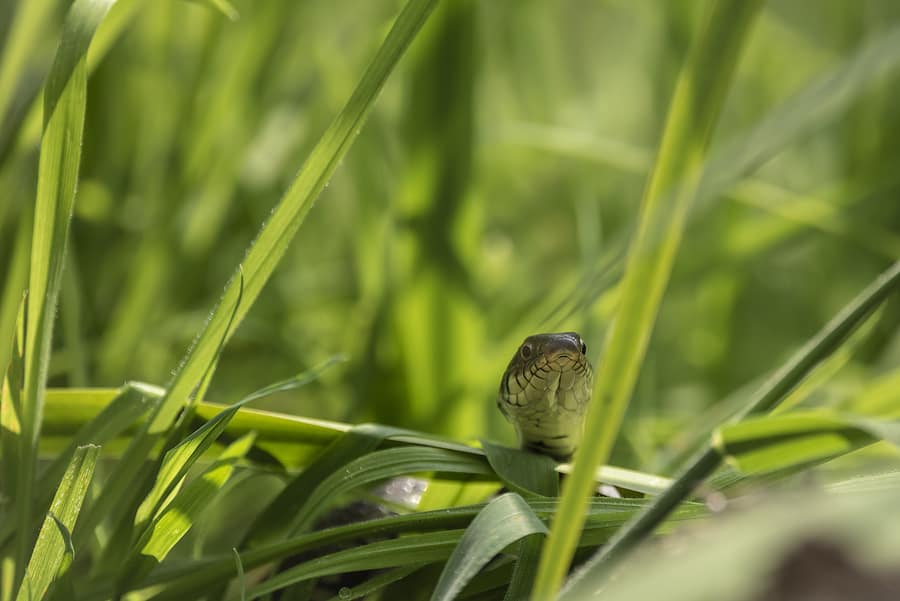While most snakes you encounter are harmless, many of us still don’t want to come across one in our yard or home. While our first instinct may be to run, most snakes are actually beneficial to have around – they help keep other pest populations under control (rodents, frogs, etc.).
Snakes will come into your yard in search of 2 things: shelter and food. Snakes will seek out shelter to have a place to rest, breed, and hunt. Common places snakes are found include overgrown grass, dense brush or shrubs, leaf piles, rock piles, compost, or areas with moisture like underneath bird baths, around leaky faucets and hoses, or near ponds or swimming pools. Snakes will also come looking for food. Snakes love to eat rodents, moles, frogs, fish, snails/slugs, and other small insects.
If you prefer not to encounter snakes around your home, here are 7 natural ways you can keep snakes away.
Get Rid of Food Sources
Snakes will come around looking for food so if your home provides them with that, you’ll be more likely to encounter them. Getting rid of these food sources will encourage snakes to move along in search of something to eat. Make sure common pests that snakes like to eat are kept under control. Scheduling routine pest control can help with this.
Get Rid of Water
Snakes are also attracted to areas with a lot of moisture. Eliminate standing water in your yard where possible. Repair leaky faucets and replace leaky hoses. Keep pools, ponds, and other water features maintained. If using sprinklers, make sure they are running in the morning so the water has time to soak in or evaporate before it gets dark. This helps keep soil in your yard from being too wet.
Get Rid of Hiding Spots
Snakes will look for places around your home to hide so they can breed and rest. Get rid of coiled hoses or use hose boxes. Avoid using rock piles in your landscaping, if possible. Store firewood in boxes or elevate it when possible. Keep your grass mowed and dense brush cleared out. Seal off or add fencing to any open areas under sheds or other buildings. If you are using snake-proof fencing, make sure it is made of steel mesh or plastic sheeting, it is at least 3 feet high and 4 feet deep, it is flush with the ground, and it is angled outward.
Use Snake-Repelling Plants
Some plants are known to repel snakes. Try to incorporate these plants into your landscape design where possible. Common snake-repelling plants include marigolds, lemongrass, Mother-in-Law’s tongue, wormwood, onion, and garlic.
Fill In Burrows
Gophers, moles, and voles dig burrows across your yard. Once they’ve been eliminated, these old gopher holes and burrows can remain on your property. Snakes will commonly use them for shelter as they provide a great place for them to hide, rest, and breed. Fill in any of these holes and burrows with dirt or gravel. This will help deter snakes from using them.
Use Natural Predators
Snakes have a few natural predators that can help keep them away. Common snake predators include cats, raccoons, pigs, turkeys, guinea hens, and foxes. Keeping any of these animals around your home will help deter snakes from coming near. You can also buy fox urine and sprinkle it around your property to help deter snakes, as well.
Use Natural Repellents
There are several natural products that are known to repel snakes. These natural snake repellents can be used around the perimeter of your property, around pools, along the edges of ponds, and anywhere else you have noticed snake activity.
- Ammonia. Ammonia is especially effective around pools and ponds. Soak rags in ammonia and put them in unsealed plastic bags. Place the bags around pools and ponds to help keep snakes out. For best results, change them out daily.
- Naphthalene. Naphthalene is commonly found in many commercial snake repellent products. It can also be bought in pure form and used around your property.
- Sulfur. Sulfur offers twofold irritation to snakes. It puts off an odor that snakes dislike; it also irritates their skin. You can use sulfur around the perimeter of your property or anywhere snakes have been spotted. It’s best to use gloves as it can also irritate human skin, as well.
- Clove and cinnamon oil. These two natural ingredients work best when combined together to repel snakes. Mix them together in a spray bottle and spray anywhere snakes have been seen.
- Garlic and onions. Garlic and onions not only work when planted in your yard, but they also work as a natural snake repellent product as they both contain sulfonic acid which is known to repel snakes. Chop up both garlic and onions and mix them with rock salt. Sprinkle the mixture around your yard to repel snakes.
- Vinegar. Standard vinegar is an effective snake repellent around water sources. No dilution is necessary. Pour standard white vinegar around the edges of ponds and pools for snake deterrence.
- Lime. Lime is effective when mixed with hot pepper or peppermint oil. Mix these together in a glass bottle and apply around the perimeter of your yard.
Despite our best efforts, snakes can still make their way into our yards and homes. If you have a problem with snakes, contact your local pest control company who specializes in snake removal who can help you properly identify the type of snake you have (venomous vs nonvenomous) and help safely and humanely remove it from your property.
You May Also Be Interested In:
How Do Cockroaches Get Into the House?
Identify and Prevent Brown Recluse in Your Tennessee Home

